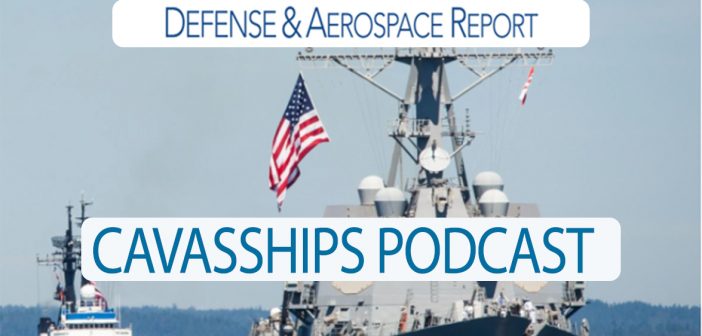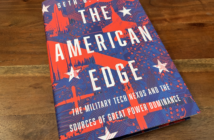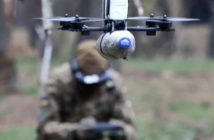Welcome to the CavasShips Podcast with Christopher P. Cavas and Chris Servello…a weekly podcast looking at naval and maritime events and issues of the day – in the US, across the seas and around the world. This Week…Russia’s war in Ukraine continues to rage, with an end to the fighting nowhere in sight. But at some point the fighting will stop and — what then? The naval and strategic significance of the Black Sea is likely to drastically change and take on an added significance in any sort of standoff between Russia, NATO and the US. We’ll talk over some of the issues and the often tortured history of this waterway from a noted expert on the region, Professor Ryan Gingeras of the Naval Postgraduate School.
In this Week’s Squawk Chris Cavas discusses the big importance of small vessels.
Please send us feedback by DM’ing @CavasShips or @CSSProvision or you can email chriscavas@gmail.com or cservello@defaeroreport.com.
BUT FIRST A QUICK ROUNDUP OF NAVAL NEWS AROUND THE WORLD
This Week’s Naval Round Up: An apparent March 24 Ukrainian attack on Russian Navy amphibious ships offloading in the captured Ukraine port of Berdyansk seems to have severely damaged at least one Alligator-class landing ship and damaged at least two Ropucha-class ships. Satellite imagery taken March 25 – a day after the attack – showed fires still burning near the Project 1171 Alligator, which appears to be sunk alongside a dock. A cargo ship at the same dock also apparently was still on fire. It is not clear precisely what weapon was used to attack the Russian ships, although some sources speculate it was a short-range ballistic missile. Russian media had featured the ship on March 21 offloading armored vehicles in what was called the demilitarized port of Berdyansk. The sinking of the Alligator is the most significant Russian Navy loss so far in the war – although the ships date from the 1960s they are still capable of carrying significant loads..
Japan on March 22 commissioned the first of a new class of stealthy multi-mission frigates. The KUMANO is the first of a planned twenty-two Mogami or FFM-class ships of about 5,000 tons that represent a considerable design departure for the Japanese Maritime Self-Defense Force. Three more FFMs are currently under construction in two shipyards.
The Japan-based destroyer USS RALPH JOHNSON made a transit of the Taiwan Straits on March 17 that was widely criticized on Chinese media. The US Navy apparently did not publicize the transit – a change from recent practice. The RALPH JOHNSON made a similar transit on February 26. The US and allied partners carried out at least fourteen such Taiwan Strait transits in 2021.
Five US Navy and three US Coast Guard small ships have been decommissioned in March, all serving with the US Fifth Fleet based Manama, Bahrain. The 110-foot Island-class Coast Guard cutters MAUI, MONOMOY and WRANGELL are being replaced by new and more capable 154-foot Fast Response Cutters. The Navy’s Cyclone-class patrol coastal ships TEMPEST, TYPHOON, SQUALL, FIREBOLT and WHIRLWIND have been decommissioned with no replacement for their role patrolling the Persian Gulf and providing force protection for visiting warships.
Cavas Squawk:
As noted earlier in the podcast, over the past few weeks several small but useful vessels have been decommissioned from the US Navy and Coast Guard, all serving with the Fifth Fleet based at Bahrain in the Persian Gulf. Those ships were all rode hard and are being put up wet, if you will, and all are now available to continue their careers under friendly foreign flags. But it’s interesting to note that none of these ships wound up doing what they were originally intended to do.
The Cyclone-class patrol ships started out as a requirement from the Navy’s special warfare community, who wanted something large enough to support covert insertion teams. But after the first ship was delivered in 1993, special warfare thinking had changed, and the community rejected the ships as being too large for the mission. Big Navy – focused on blue water power projection and expensive Aegis warships – had no particular need for them either, and even as they continued to be built, the fleet debated whether or not the ships had any real use. By the beginning of the 2000s all 13 ships in service were to be decommissioned and disposed of.
Then came 9/11 and a new clamor from dozens of seaport cities for a visible Navy presence. The little Cyclones fit the bill nicely – some were even temporarily transferred to the Coast Guard for the patrol role. After the invasion of Iraq the ships were seen as very useful to patrol the Persian Gulf, and eventually 10 PCs were based in Bahrain where they performed any number of useful duties. Now, ironically, rather than being thrown away when nearly new, most of them are being retired having performed sterling service.
The Coast Guard’s 110-foot Island-class patrol cutters didn’t even start out as Coast Guard ships – they were ordered in the early 1980s by the US Customs Service to combat a sharp rise in illegal immigration attempts from Cuba. The Coast Guard took over the program, but even then the ships were never intended to last more than 12-15 years in service before being thrown away. The cutter MAUI – a 110-footer I was privileged to get underway with a few years ago in the Gulf – was commissioned in 1986. By the original metric she should have been disposed of no later than 2001, yet she served well more than 35 years, mostly in roles and missions far removed from their original purpose.
The point is this – situations change, requirements change, technologies change, but these small ships that either nobody wanted or were supposed to be disposed of wound up being highly adaptable to new missions that weren’t originally on the table. Just keep that in mind the next time an official wants to dispose of legacy programs that don’t fit what the current establishment wants to buy. Adaptability is as key to success as figuring out what you want to buy in the first place.




